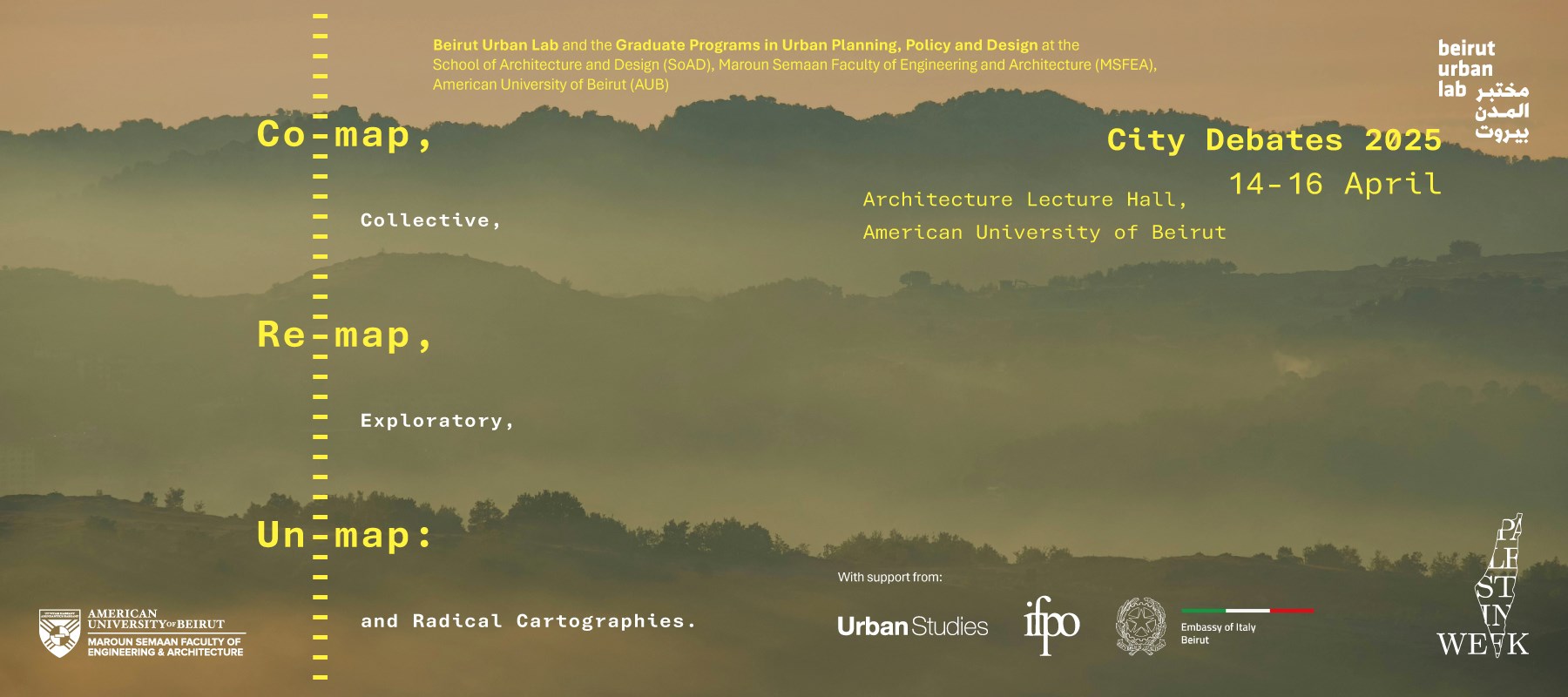City Debates 2025: Co-map, Re-map, Un-map

The 21st edition of City Debates —on collective, exploratory, and radical cartographies— engages with mapping, data visualization, and spatial representation, specifically as they intersect with urban research, furthering a variety of ways through which cities, geographies, and environments are studied and understood.
Dates: April 14 - 16, 2025
Location: Architecture Lecture Hall – Dar al Handasah Architecture Building, School of Architecture and Design (SoAD), AUB
Program
DAY 1: Monday April 14
5:30-6:00 pm | Registration, Coffee
6:00-6:15 pm | Opening Session
Alan Shihadeh, Dean, MSFEA, AUB
Yaser Abunnasr, Acting Director, SoAD, AUB
Ahmad Gharbieh, Beirut Urban Lab, SoAD, AUB
6:15-7:30 pm | Day 1 Keynote
ATLAS OTHERWISE: Mapping Location Beyond Geolocation
Nishat Awan, UCL Urban Lab
Discussant: Monica Basbous, Universitat Pompeu Fabra
DAY 2: Tuesday April 15
09:30-11:00 am | Panel 1: Tracing Territories (of migration, governance, conflict)
Jadd Hallaj, LUGARIT
Pilot books and Landing Spaces: Navigating Plural Urban Experiences
Martina Bovo, IUAV University of Venice / Politecnico di Milano
Spatializing Loss, Delineating Recovery
Nadine Bekdache, Public Works Studio
Discussant: Mariangela Gasparotto, Institut français du Proche-Orient
11:00-11:30 am | Coffee break
11:30 am-01:30 pm | Panel 2 [with PALESTINE WEEK]: Figuring Places (in evidence, narrative, archive)
Archiving Gaza towards the Production of Recovery Imaginaries
Batoul Yassine, Beirut Urban Lab
Surfacing Localised Stories: Mapping, Scrollytelling and (Semi)automation
Ahmad Barclay, Office for National Statistics, UK
A Cartography of Genocide
Nour Abuzaid, Forensic Architecture
MAPPING INSURGENSEAS, Part I: The Oceans of Palestine Solidarity
Nikolas Kosmatopoulos, Faculty of Arts and Sciences, AUB
Discussant: Nadi Abu Saada, SoAD, AUB
01:30-03:00 pm | Lunch Break
03:00-04:30 pm | Panel 3: Centering Margins (on subjects and representations) [Virtual Presentations]
Data Feminism book talk screening
Catherine D'Ignazio, MIT and Lauren Klein, Emory University
Tools for Collaborative Research
Pablo Ares, Iconoclasistas
Discussant: Jana Traboulsi, SoAD, AUB
04:30-05:00 pm | Coffee break
05:00-06:30 pm | Day 2 Keynote [Virtual Presentation]
GPS for the Brain: Cognitive Mapping Revisited
Laura Kurgan, Center for Spatial Research, Columbia University
Discussant: Mona Fawaz, Beirut Urban Lab, SoAD, AUB
DAY 3: Wednesday April 16
09:30-11:00 am | Panel 4: Framing Ecologies (around water, weather, self)
Cartographies of Water Commons: Fluid Ecologies and Disrupted Landscapes
Joelle Deeb, The Water Commons Archives-Syria
The Year of the Weather
Sophie Dyer and Sasha Engelmann, Open-weather
Fractal Catastrophes Generate New Solidarities
Imani Jacqueline Brown, Queen Mary, University of London
Discussant: Elizabeth Saleh, Department of Sociology, Anthropology, and Media Studies, AUB
11:00-11:30 am | Coffee break
11:30 am-01:00 pm | Panel 5: Actioning Commons (with vernaculars, tactics, knowledges)
Counter-mapping as Insurrection of Subjugated Knowledges: How Subaltern Fishers and Activists are Saving the Ennore Wetlands in Chennai, India
Nityanand Jayaraman, University of Waikato
Mapping to Instigate Action, Mapping for Interaction
Omar Khaled, CLUSTER
Mapping in Common: Tactical Cartographies and Collective Action
Ana Méndez de Andés, Urban Commons Research Collective
Discussant: Mona Harb, Beirut Urban Lab, SoAD, AUB
01:00-02:30 pm | Lunch Break
02:30-04:00 pm | Day 3 Keynote [Urban Studies Journal Annual Lecture]
New Directions for Southern Urban Praxis
Gautam Bhan, Indian Institute for Human Settlements
Discussant: Rami Zurayk, SoAD, AUB
04:00-04:30 pm | Coffee break
04:30-06:00 pm | Roundtable & Wrap-up
How and Why to Map from the South
Moderator: Ahmad Gharbieh, Beirut Urban Lab, SoAD, AUB
Concept Note
Of course, the threads are neither mutually exclusive nor comprehensive as far as cartographic output and data visualization are concerned. Rather, they are issues that have been central to the critical shift within the field over time, and the conference aims to explore a more granulated set of themes across its multiple panels. These include questions of tools and technologies, positions and positionalities, ecologies and environments, conflict and crises, data access and scarcity, borders and territories, and other important deliberations within a rich, multifaceted, and continuously expanding cross-disciplinary sphere. Together, they aspire to delineate a well-rounded program that addresses the theme of mapping from a pertinent contemporary place, fostering dialogue between different methods and showcasing a variety of collective, exploratory, and radical cartographies in multiple contexts.